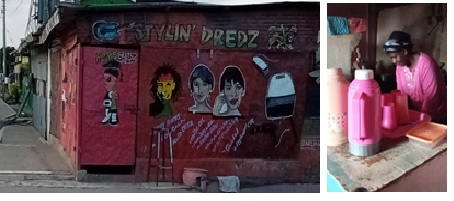From Mary Kiguru, Creator and Co-ordinator of Sujali and Mike Calvert, ex-York St John University, York, England
This has been a very interesting year according to Mary. Sujali women and men are resilient. Covid-19 has not spared our community. We have had funerals within the community every other week. Like the rest of the world, this small village on the outskirts of Nairobi has had to bear its share of tragedy.
 Our own Grace lost her son to an accident that affected her business. They had just started doing up a car for business. This has been tragic, but Grace is resilient. With support from the community, she is facing this tragic moment of her life with her daughter in law. They have opened a salon. Grace borrowed KES200,000 (almost £1,400) in June to be able to start the transport business. What I admire most about her is her zeal and determination. She is determined to excel, and she becomes the strong tower that the daughter in law will look up to. If you remember, Grace lost her husband in 2020 at the height of the pandemic. Losing her son in 2021 is no small blow. This is the salon where Grace is supporting her daughter in law.
Our own Grace lost her son to an accident that affected her business. They had just started doing up a car for business. This has been tragic, but Grace is resilient. With support from the community, she is facing this tragic moment of her life with her daughter in law. They have opened a salon. Grace borrowed KES200,000 (almost £1,400) in June to be able to start the transport business. What I admire most about her is her zeal and determination. She is determined to excel, and she becomes the strong tower that the daughter in law will look up to. If you remember, Grace lost her husband in 2020 at the height of the pandemic. Losing her son in 2021 is no small blow. This is the salon where Grace is supporting her daughter in law.
Nzuve, one the men that joined us in 2020 has stayed afloat through the season. Being in food business makes it possible to still remain in business even though not as it used to be. Nzuve had a top up in February of KES30,000 (£200) to boost his business.
 This is Kitonga, who owns a hardware store. He has had his own tragedies this year. His son had an accident that required a lot of resources while at the same time his mother was ill and came to stay with him. In spite of all this, he was able to take a loan of KES150,000 (£1,000) to scale up his business. When I visited him this week, I found the shop fully stocked.
This is Kitonga, who owns a hardware store. He has had his own tragedies this year. His son had an accident that required a lot of resources while at the same time his mother was ill and came to stay with him. In spite of all this, he was able to take a loan of KES150,000 (£1,000) to scale up his business. When I visited him this week, I found the shop fully stocked.
How is Susan Doing with her clothes shop?
 She had to take care of her daughter this year (Mary Kiguru) and manage her business. Due to the bad climate, she had to lay off her employee and be full time at the shop. This was also good for her since the pandemic did not allow too much movement. She has had time to connect with children and those around her. She has not taken a new loan yet this year.
She had to take care of her daughter this year (Mary Kiguru) and manage her business. Due to the bad climate, she had to lay off her employee and be full time at the shop. This was also good for her since the pandemic did not allow too much movement. She has had time to connect with children and those around her. She has not taken a new loan yet this year.
Elizabeth – the hairdresser!
This year Elizabeth took a KES100,000 (£700) loan. This is the highest loan she has taken over the years. Her business has continued to thrive throughout the season and she did not close down during the pandemic.
Janet has also continued to thrive through the season. She has taken two small loans of KES50,000 (£340) and KES10,000 (£66) to cover specific needs during the season.
Alice – the chicken lady!
Now what can we say about Alice? She has expanded as always. In addition to her extensive production of chickens, she now rears pigs!
Our Financial Health
The initial outlay for three women was KES66,000. This rose to KES350,000 and with interest has grown over the years. As has been pointed out in the past, micro-finance is a gift that keeps on giving. The money has been lent out many times over and allows women to access funds at a relatively low level of interest in a country where bank accounts are difficult to obtain for women. Last year, which was so challenging, saw loans of KES560,000 (£3,800) which is a great deal of money in terms of the people’s lives.
Next year will see our 10th anniversary of Sujali and we hope that the women and men of Sujali remain healthy and successful with their enterprises, and we can all celebrate together.
Sujali is the name given to a group of mainly women who make up the self-help group of micro-investors begun in 2012. Sujali is effectively a ‘chama’, an informal group of people, mainly women, who get together for mutual help with finance. It is estimated that there are over 300,000 chamas in Kenya.